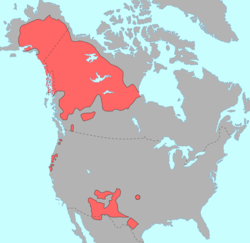Athabaskan-Eyak-Tlingit
| Na-Dene | |
|---|---|
| Athabaskan–Eyak–Tlingit | |
| Geographic distribution |
North America |
| Linguistic classification |
Dené–Yeniseian?
|
| Subdivisions | |
| Glottolog | atha1245 |
 |
|
Na-Dene (/ˌnɑːdᵻˈneɪ/; also Nadene, Na-Dené, Athabaskan–Eyak–Tlingit, Tlina–Dene) is a family of Native American languages that includes at least the Athabaskan languages, Eyak, and Tlingit languages. An old inclusion of Haida is now considered invalid.
In February 2008 a proposal connecting Na-Dene (excluding Haida) to the Yeniseian languages of central Siberia into a Dené–Yeniseian family was published and well received by a number of linguists. It was proposed in a 2014 paper that the Na-Dene languages of North America and the Yeniseian languages of Siberia had a common origin in a language spoken in Beringia, between the two continents.
Edward Sapir originally constructed the term Na-Dene to refer to a combined family of Athabaskan, Tlingit, and Haida (the existence of the Eyak language was not known to him at the time). In his "The Na-Dene languages: A preliminary report", he describes how he arrived at the term (Sapir 1915, p. 558):
The name that I have chosen for the stock, Na-dene, may be justified by reference to no. 51 of the comparative vocabulary. Dene, in various dialectic forms, is a wide-spread Athabaskan term for "person, people"; the element *-ne (*-n, *-η) which forms part of it is an old stem for "person, people" which, as suffix or prefix, is frequently used in Athabaskan in that sense. It is cognate with H. na "to dwell; house" and Tl. na "people". The compound term Na-dene thus designates by means of native stems the speakers of the three languages concerned, besides continuing the use of the old term Dene for the Athabaskan branch of the stock.
...
Wikipedia
